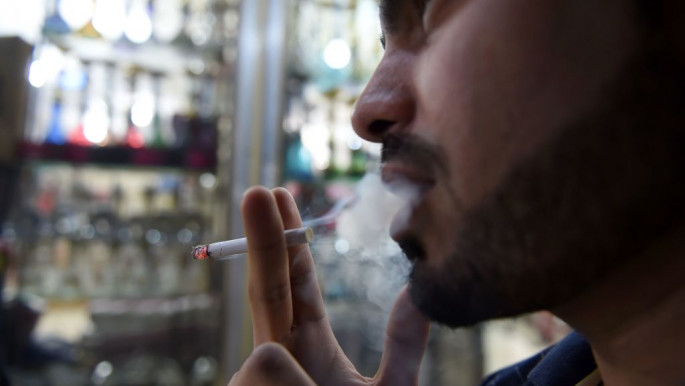
A tale of two evils: Islamic State is gone, but the tobacco industry remains
Alongside burned veils and shaved beards, cigarettes and smoking have become linked to the demise of the self-proclaimed caliphate's territorial holdings.
Raqqa, freed from IS' yoke, is the latest city to see residents contemplate the devastation while enjoying at least one newfound freedom: Smoking without fear of fines, flogging, or worse.
That scene, captured by local journalists and foreign news crews, is both moving and heart-breaking. It also raises critical questions for smokers and policymakers across the Arab world. How did cigarettes become the symbol of liberty, and how much damage is tobacco doing to the region?
Associating cigarettes and freedom is nothing new.
In the 1920s, Edward Bernays - the father of modern public relations - helped the American Tobacco Company market cigarettes to women by hiring female activists and marchers to smoke during New York's Easter Day Parade and present cigarettes as "torches of freedom" in the first years of women's suffrage.
This messaging - linking smoking to western values or women in the workplace - continued through the 1990s. When prohibitions on tobacco advertising put an end to it, Big Tobacco redirected its energies towards the developing world - particularly the Arab world.
An enduring hold over an addicted region
Since the early 2000s, women and young people in the region have increasingly picked up the habit of smoking hookah, traditional water pipes known in the Arab world as shishah or nargilah.
This gives the industry inroads to the two demographic groups that traditionally consume less tobacco. Japan Tobacco International (JTI) took advantage by buying Alnakhla, the largest producer of hookah molasses in Egypt and the Arab world, in 2013.
 |
|
| A Syrian woman smokes a cigarette in the northern town of Manbij, Syria, after it was liberated from the Islamic State group [Twitter] |
Middle Eastern and North African governments are also vulnerable to Big Tobacco's influence.
Border and customs officials are suspected of complicity in tobacco smuggling, helping the industry to maintain its foothold in warzones such as Syria. At a higher level, the Big Five companies (which includes PMI, JTI, and BAT but also Imperial Tobacco and China Tobacco) have formed alliances with local agents who often hold national tobacco monopolies.
The Big Five's partners leverage their positions as business elites and community pillars to advocate for the industry's interests.
The influence they wield can be jarring.
In Saudi Arabia's Eastern Province, for example, residents have their choice of brands when it comes to smoking, but more often than not, only one choice for comprehensive specialised cardiac care when that smoking leads to heart disease: The government-partnered (but private) Saud al-Babtain Cardiac Center.
The al-Babtain family that owns the centre is also the primary distributor of PMI's Marlboro brand in the kingdom. Patients who try to go to public hospitals instead face access issues and long wait times.
 |
How did cigarettes become the symbol of liberty, and how much damage is tobacco doing to the region? |  |
The industry has consistently defended its ample footprint in the region (where 25.4 percent of adults still smoke), occasionally resorting to extreme measures.
An internal 1985 report by Philip Morris International (PMI) advocated discrediting international moves against tobacco by claiming the World Health Organization (WHO) had "joined forces with [Muslim] fundamentalists who view smoking as evil… [and have] gone further by encouraging religious leaders previously not active anti-smokers to take up the cause".
The same report recommended that PMI marketing teams refer to anti-smoking religious figures as "fundamentalists".
This is the same approach PMI applied to western advocates of tobacco control, tarring them as extremists through "Project Sunrise". Big Tobacco has prudently stepped back from religious arguments, but retains much of its ability to hawk products in Middle Eastern and North African markets.
Cracks beginning to show?
For all its influence, the tobacco industry's hold over Arab smokers may finally be cracking. The region has one of the highest smoking rates in the world, but there is growing interest in quitting and an expanding market for de-addiction programmes.
Driven by demand in the United Arab Emirates, Egypt and Algeria, smoking cessation has become a $1.04 billion industry and is expected to grow to $2.1 billion by 2022.
 |
|
| The price of a pack of cigarettes doubled for Saudi Arabian smokers under first-time tax measures to help the kingdom cope with a drop in oil revenues [AFP] |
Civil society groups and NGOs are also growing in strength and leading anti-smoking campaigns. They may soon have powerful governmental allies. In Jordan, public alarm over a smoking rate projected to reach 50 percent by 2025 has led to a ban on smoking in public places.
High demand for smoking addiction centres in Saudi Arabia has fostered public-private partnerships between the Ministry of Health and private medical clinics, such as ABEER in the port city of Jeddah.
With the administrative, economic, and social reforms currently underway (including in Bahrain, Oman, and Saudi Arabia), public health is now seen a fundamental necessity for freer, more productive societies.
 |
Even IS - for all its showy burnings of cigarette cartons and medieval punishments - allowed a tobacco smuggling industry to flourish under its 'caliphate' |  |
Partnering with private medical clinics alone is obviously not enough. More direct government involvement is key for the Arab world to match the West's downward trend in smoking rates.
The Gulf Cooperation Council is taking one such step by raising taxes on tobacco products, including Saudi Arabia's "sin taxes" rolled out this past summer. The new taxes doubled the cost of cigarettes in the kingdom, making prices comparable to parts of western Europe and the United States.
The GCC also seeks to curb tax dodging, smuggling, and consumption through stricter tracking systems; the tobacco industry itself claims that billions of "illicit white cigarettes" come from the UAE's Jebel Ali free trade area. Stricter zero-tolerance policies for advertising and plain packaging will also help.
Playing the industry's game
Big Tobacco will almost certainly fight these steps, but Gulf governments are well positioned to prioritise their citizens' general health and longevity. The tobacco industry playbook as applied elsewhere is well documented; as European and American officials consider past mistakes, their GCC counterparts should be able to sidestep them.
The European Union, for example, has pursued controversial anti-smuggling arrangements with the four major tobacco companies to recoup billions of Euros in tax revenues lost to the illicit tobacco trade. The first was reached with PMI in 2004 and terminated only last year; three others remain in effect, and two run through 2030.
 |
The industry has a reputation for creating, maintaining, and increasing cigarette consumption in conflict-riven African states |  |
Yet more collaborations between the EU and industry are under consideration, including a Codentify "track and trace" system to combat smuggling developed by PMI and currently run by former tobacco executives. Anti-smoking advocates argue these agreements likely violate the WHO's Framework Convention on Tobacco Control (FCTC), but also that the tobacco industry itself has often been implicated in smuggling.
Officials and campaigners in Africa and across the Middle East can testify to that fact.
The industry has a reputation for creating, maintaining, and increasing cigarette consumption in conflict-riven African states. New revelations about British American Tobacco (BAT) in Somalia and South Sudan, as well as allegations of bribery to undermine tobacco control in Kenya, have sparked an investigation by the British government.
Of course, the trafficking game is played on all sides. Even IS - for all its showy burnings of cigarette cartons and medieval punishments - allowed a tobacco smuggling industry to flourish under its "caliphate".
That caliphate will soon be consigned to the dustbin of history. No one can begrudge the citizens of Raqqa (or Mosul or Tal Afar) their desire to light up in celebration, but for the rest of the Arab world, it's time to start reaching for nicotine gum instead.
Faisal Abualhassan is a researcher at the King Faisal Center for Research and Islamic Studies.
This article was originally published by our partners at Orient XXI.
Join the conversation: @The_NewArab
Opinions expressed in this article remain those of the author, and do not necessarily represent those of The New Arab, its editorial board or staff.





 Follow the Middle East's top stories in English at The New Arab on Google News
Follow the Middle East's top stories in English at The New Arab on Google News


